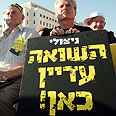
Holocaust survivors' protest (Archive)
צילום: גיל יוחנן
Don’t call me Nazi
Shoah references often infuriating, but there’s no room for law that enforces politeness
The Holocaust is an integral part of our Jewish and Israeli identity. It does not belong to any sector and references to it are common within the Israeli public discourse to a much larger extent than we’re willing to admit – starting with soccer stadiums (and not necessary in Jerusalem,) and ranging from disengagement opponents on the Right to Arab Knesset members on the Left and to Professor Yeshayahu Leibowitz’s well-known “Judeo-Nazis” reference.
Even Holocaust survivors made use of the Shoah recently as part of their protest over government allowances, when they marched to the Prime Minister’s Office wearing Yellow Stars.
Knesset Member Colette Avital’s bill, which forbids references to the Holocaust (or more accurately, Nazi symbols and nicknames,) was approved last week by the Knesset Law Committee. Should the bill be approved by parliament, it will apply to all the abovementioned sectors. This bill would not hurt a specific community, but rather, affect the entire population. The bill’s objective is educational, and the proposed means of enforcement – a three-year prison term – is draconian and may serve to cool off and limit the boundaries of public discourse.
Criminal laws that forbid citizens from insulting others are uncommon in most Western countries, and particularly in countries whose legal system is based on common law, such as England and the United States, from which we inherited the tradition of safeguarding freedom of speech. Such laws can be found in a few European countries, such as Germany and France, and are considered as highly limiting when it comes to freedom of speech.
The bill symbolizes an unwise shift from the common law influence, which we relied on thus far in safeguarding the freedom of speech, to the influence of the continental-European law, without engaging in a serious debate on the implications of such move.
Freedom of speech in Israel being eroded
Indeed, Shoah references infuriate many of us, me included, but a democratic and tolerant society has no room for bills that attempt to educate the public to speak politely by using criminal sanctions. Precisely because the Holocaust is such a central event in the Israeli perception, so many sectors make use of it in order to enhance the message they convey.In any case, there is no law that would be able to uproot Holocaust references from the Israeli discourse. The proposed bill is not excepted to uproot the phenomenon, but rather, only serve to put people or groups who wanted to express harsh protest behind bars.
Moreover, Israeli law does provide an outlet, through our libel legislation, to those hurt by being referred to as “Nazis,” as happened in the case of rightist activist Itamar Ben-Gvir and Maarriv Editor in Chief Amnon Dankner. In addition, the law banning Holocaust denial already includes criminal sanctions against Holocaust deniers. In other words, Knesset Member Avital proposed a draconian solution where a legal solution already exists.
The tendency in recent years to erode the freedom of speech in the name of promoting other social values, headed by human dignity, should bother any freedom-loving liberal. Slowly, freedom of expression in Israel is being emptied of any substance, and Israeli democracy is turning into a country where expression is curbed rather easily. Yet it was precisely the Holocaust which taught us that safeguarding the foundations of democracy, headed by freedom of expression, is the guarantee for a stable and healthy society.
Guy Carmi is an attorney specializing in freedom of expression










